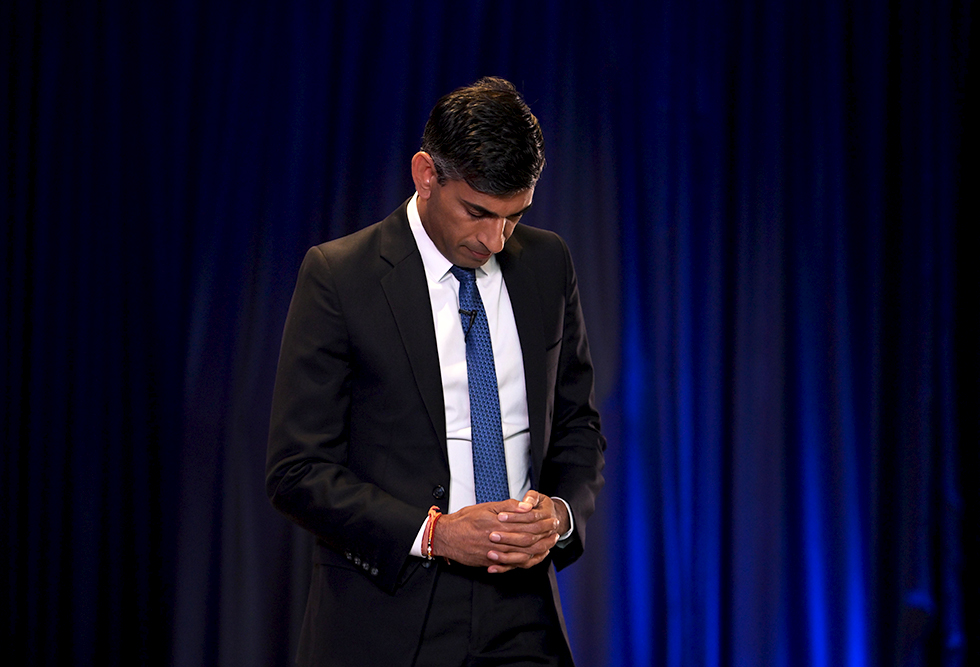
Rishi Sunak has released his tax return. At first glance, you may think it simply shows a rich man paying an awful lot of tax.
Over the three most recent tax years he earned £4.766m and paid £1.053m in tax. Fair play to him, eh. But look closer and the Prime Minister’s tax return exposes the topsy-turvy nature of the UK’s tax system. Last year he paid an effective tax rate of 22 per cent on an income of nearly £2m.
This is just over the 21 per cent tax rate a nurse on the average £37,000 salary pays, as pointed out by the Tax Justice UK pressure group. Or, as the New Statesman’s senior data journalist Ben Walker puts it, when you factor in student loan repayments, Sunak pays a lower tax rate than “I, a graduate, on an effective tax rate of 25.6 per cent”.
So last year Sunak made £1,970,992 through various means (ministerial salary, investment income, etc) and paid various taxes that amounted to £446,430 – 22.7%
— Ben Walker (@BNHWalker) March 22, 2023
… meanwhile I, a graduate, pay an effective tax rate of 25.6%. Christ.
Why the discrepancy? Much of Sunak’s earnings come not from income but capital gains: money you earn from things that aren’t work, like selling stocks or property. In the 2021-22 tax year his capital gains earnings were more than £1.6m, but he only had to pay £325,826 of tax on those, compared with £120,604 of tax on his income through work of £329,561.
This is because capital gains tax is charged at a much lower rate than income tax. In other words, wealth is taxed far less than work in the UK.
Politicians on all sides of the House, including some Conservatives, have been calling for capital gains tax to be aligned with income tax to make the system fairer and raise significant revenue. It would raise an extra £14bn a year, according to the Office for Tax Simplification, which advises the government.
The afternoon before Jeremy Hunt’s Budget this month politicians, tax experts and a couple of “patriotic millionaires” wishing to be taxed at a higher rate met in a flock-wallpapered riverside room in the Palace of Westminster to discuss how to pressure party leaders into making such a reform.
The Tories there expressed frustration that this was once their party’s policy: Nigel Lawson, chancellor under Thatcher, aligned wealth and income tax in his 1988 budget, but this was undone by reforms by Gordon Brown, the Labour chancellor, in the late Nineties.
On the Labour side, MPs said there was “nothing” stopping Keir Starmer and Rachel Reeves, the shadow chancellor, adopting this policy and that their plan to abolish non-dom status only goes so far (the benefits of it have already been “spent ten times over” on Labour proposals, quipped one Labour MP). From socialist MPs like Richard Burgon and Rebecca Long Bailey to Blairite veterans like Margaret Hodge, there is now pressure on the shadow Treasury team from numerous factions to propose this change.
Hodge told me recently that Labour policy should be to “tax the income that we as individuals get from our wealth at the same rate as you tax the income we get from work”. But she also remarked that she thought she’d get “hit by the front bench” for saying this, and that the party under Starmer is “nervous” and “reluctant” to focus on tax justice.
This reluctance is partly down to Labour’s traditional reputation as a tax-raising party. Memories loom large of the party’s 1992 “shadow budget”, which included tax and national insurance rises on higher earners to pay for child benefit improvements. This has gone down in party lore, if erroneously, as a reason for the surprise election defeat that year.
Labour is also aware of complicated public attitudes towards wealth. British voters on the whole see wealth as a positive thing, representing an individual’s aspiration and quest for security for themselves and their family. (More broadly, this is why Labour hasn’t used the tax return story to attack Sunak’s wealth.) It doesn’t necessarily follow that taxing wealth at a higher rate will automatically be popular – though equalising capital gains tax with income tax sounds like the most “common sense” option when presented to focus groups.
It is this policy stalemate that means Rishi Sunak is taxed at 22 per cent, and the rest of us are paying more in tax than we have for 70 years.
[See also: Boris Johnson pleads idiocy]






